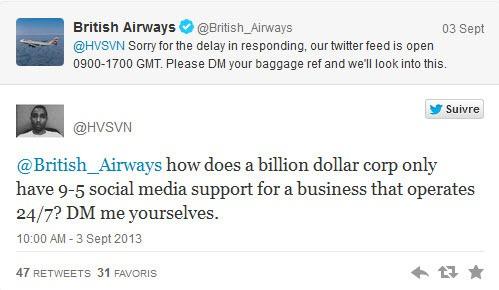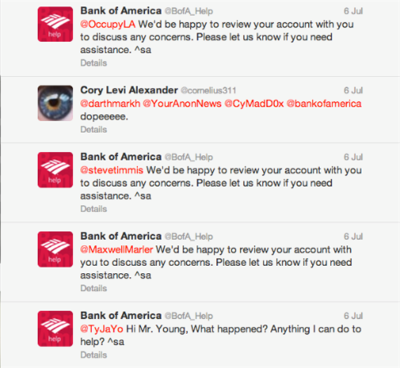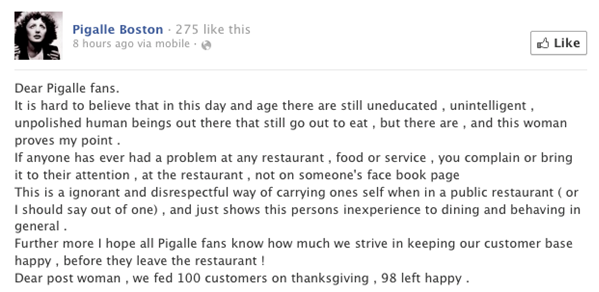
So what’s the point of focusing on the negatives? Well, for starters, we enjoy a good laugh just like everyone else. More importantly, we want to ensure – without a doubt – that you never find yourself in the terrible PR messes that these companies have experienced. It’s completely unnecessary and easily avoidable. While following our advice for effective social media customer service practices should help you avoid most issues, nothing leaves a mark quite like seeing a curious child actually sticking a butter knife into an electrical outlet.
The Importance Of Monitoring And Quick Replies
We’ve told you on many different occasions how much monitoring social sites, and the web in general, is an extremely important tool for your business or brand. We’ve also emphasized that the faster you can reply to mentions and comments, the better the impression on your customers will be. No matter how many times we write about these practices, nothing could prove the point better than the following exchange on Twitter involving British Airways:
In the eight hours between the first tweet and the response from the airlines, the comment was seen by some 76,000 Twitter users. That is what we call viral. Not every business can reply 24/7 to online complaints of course, but when your business operates 24/7 then it’s kind of expected.
Automation Done The Wrong Way
Automation in social media can be a wonderful tool when used properly, but unfortunately not everyone understands what that proper use is. It’s certainly acceptable to have something like an automated reply for new followers thanking them for the follow, but setting up an automated message for any and every mention is counterintuitive to the idea of customer service, as was demonstrated by both American Airlines and Bank of America. American Airlines sent out an upbeat generic message to any and all mentions:
And Bank of America, even worse, automated a very “salesy” message to all mentions. This thread began with a tweeter discussing being chased off by police for drawing with chalk on the sidewalk outside a BoA branch in New York. Every comment on the thread received the same reply from @BoFA_Help:
How To Insult Your Customers 101
You are likely going to have disgruntled customers that complain in an ugly way online at some point. The first rule of dealing with these complaints is to take them offline as quickly as possible. The second rule is to never, never insult them. Common sense? One would think so, but someone forgot to tell the Pigalle Restaurant in Boston.
One customer who paid $200 for a Thanksgiving meal was apparently a little more than unhappy with what her money bought her, going so far as to say the food “tasted like vomit.” Ouch. The chef didn’t take the comment very well, responding to the post by telling the customer to “go f*** yourself.” Double ouch. Sadly, the mistakes didn’t stop there, with a follow up post from the restaurant calling the customer an “uneducated, unintelligent, unpolished human being”:
If you need to know exactly what not to say to an upset customer, just read that again.
How Not To Deal With Bad Reviews
You should definitely monitor review sites for two reasons. First, you want to find happy customers to thank them and try to encourage the spread of their positive opinions. Second, you want to find unhappy customers and do your best to resolve their issues and learn from the experience to avoid future issues. Thankfully Sendible makes this simple.
What you don’t want to do is threaten your customers, especially before they’ve even spent their money with you. A New York hotel called the Union Street Guest House did exactly that until they were called out for it. This wasn’t a post on social media, but rather a policy they posted about customers leaving reviews on Yelp and other review sites:
“There will be a $500 dollar fine that will be deducted from your deposit for every negative review of USGH place on any internet site by anyone in your party and/or attending your wedding even if you stay here to attend a wedding anywhere in the area and leave us a negative review on any internet site you agree to a $500 fine for each negative review.”
Um, really? When word got out about it, their Facebook page caught fire with angry comments, complaints about their business, and of course, people ridiculing the obviously ridiculous policy. After they removed the policy in humiliation, they tried to claim that it had been a joke. Unfortunately, that backfired as well when customers began to come forth saying that the hotel had actually tried to enforce it with them. Let this be a lesson to any and all businesses going forth: when you fight with, insult, or threaten the public online and on social media, you will lose. Every time.




